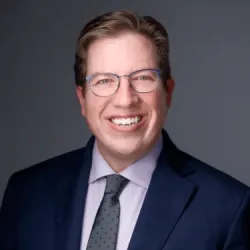“Leading Theologically” concluded its season with a new half-hour conversation between host the Rev. Bill Davis of the Presbyterian Foundation and the Rev. Dr. Bruce Grady, executive presbyter of the Presbytery of New Hope.
During their talk, which can be heard here, Davis reviewed the themes that stood out for him during the past six months’ worth of episodes. Davis, who’s been speaking with faith leaders about reconciliation, repair and reparations, asked Grady to comment on what he’d heard from those conversations.

“There was a whole lot of truth-telling” during those broadcasts, Davis told Grady. “What are some things congregations can be pulling from this?”
“I would say local congregations can extract some practical insights on how our collective histories and our particular histories shape our understanding of our world, ourselves and our relationship to our world,” Grady said, noting that one guest discussed how reparations can be “both a theological and a pastoral activity. When we talk about reparations, sometimes people frame it as some sort of transaction,” a “check written for all the injustices of the past.”
But “it’s more of a radical transformational process,” Grady said. When we understand that, “we become aware — as members, as leaders, as lay people — that this work of reparations requires a radical commitment to God, to our neighbors and to self, a commitment that goes much deeper than the notion that one can be paid for the harms that have happened over time. That changes our view of our work.”
In the faith communities of the Presbytery of New Hope, “you will find not only a diversity of theological stripes, but political stripes,” Grady said. Churches “find there’s got to be a way to navigate these differences and to enter into what God’s vision of community is,” including reparations and “a radical shift, a commitment on all sides.”
The church, “the covenant community of faith in Christ Jesus, exists for the community and for the world,” Grady said. “When we look into our [faith] communities, there is a complex set of stories, of personal experiences and personalities. At the same time, we share in struggle, in pain and in a set of human experiences.”

“There is something transformative that happens when we empty out our ego and we say, ‘I cannot become all that I am supposed to be and witness the debt load of my neighbor,’” he said. “The only way for that to happen is to engage in those relationships, which allows that transformation to take place, a transformation of our mindset and of our hearts.”
When we enter into the process of reparation, “we give up a sense of power and a sense of individuality and we say, ‘I am willing to put that aside so that I might be an agent of repair.’ There is a joy and a beauty in that form of surrender,” Grady said. “There is a beauty that we miss when we are unwilling to enter into that process.”
When Davis asked his usual final question — “What is the best thing you have heard lately?” — Grady said it “has to do with people coming together for the purpose of being in song.”
Gospel choir groups “just show up and invite all who love the music to join along,” Grady said. “They don’t necessarily know each other, but they have this common music that they share. Strangers show up anticipating they will make something beautiful together,” and “all that is necessary to do that is in the room.”
Grady called that “a beautiful metaphor for this process of repair. Everything we need to do the work has been provided. God has given each of us a unique voice in this song, and every voice comes together in such a way that makes this rich, rewarding and transformative masterpiece. You’re right,” he told Davis. “There is joy and beauty, and there are challenges and pain in this. But when we witness the final production of these gatherings, we’ll say it’s worth it.”
New episodes of “Leading Theologically” return in the fall.
Mike Ferguson, Editor, Presbyterian News Service (Click here to read original PNS Story)
Let us join in prayer for:
Ahmad Ali, Vice President and Managing Director, Investments, The Board of Pensions
Denise Anderson, Director, Compassion, Peace & Justice, Interim Unified Agency
Let us pray:
Dear Lord, you offer peace to those who come from afar. May the church hear your voice calling us to build community among all people, so that in Jesus Christ we are no longer strangers but members of the household of God. In Jesus’ name. Amen.


No comments:
Post a Comment